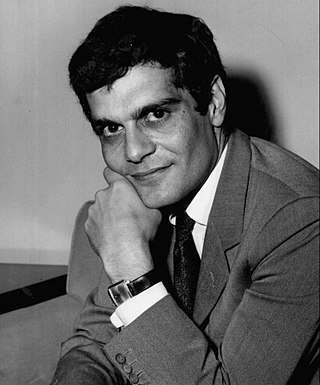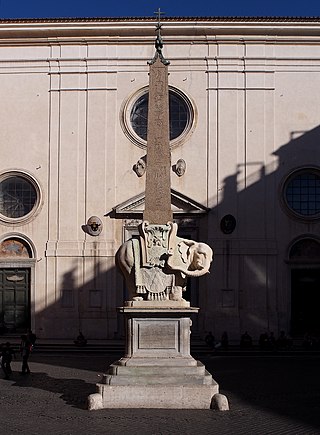
Naguib Mahfouz Abdelaziz Ibrahim Ahmed Al-Basha was an Egyptian writer who won the 1988 Nobel Prize in Literature. Mahfouz is regarded as one of the first contemporary writers in Arabic literature, along with Taha Hussein, to explore themes of existentialism. He is the only Egyptian to win the Nobel Prize in Literature. He published 35 novels, over 350 short stories, 26 screenplays, hundreds of op-ed columns for Egyptian newspapers, and seven plays over a 70-year career, from the 1930s until 2004. All of his novels take place in Egypt, and always mentions the lane, which equals the world. His most famous works include The Cairo Trilogy and Children of Gebelawi. Many of Mahfouz's works have been made into Egyptian and foreign films; no Arab writer exceeds Mahfouz in number of works that have been adapted for cinema and television. While Mahfouz's literature is classified as realist literature, existential themes appear in it.

Omar Sharif was an Egyptian actor, generally regarded as one of his country's greatest male film stars. He began his career in his native country in the 1950s. He is best known for his appearances in American, British, French, and Italian productions. His career encompassed over 100 films spanning 50 years, and brought him many accolades including three Golden Globe Awards and a César Award for Best Actor.

Alexander Proyas is an Australian filmmaker. Proyas is best known for directing the films The Crow (1994), Dark City (1998), I, Robot (2004), Knowing (2009), and Gods of Egypt (2016).

The Prince of Egypt is a 1998 American animated musical drama film produced by DreamWorks Animation and released by DreamWorks Pictures. The second feature film from DreamWorks and the first to be traditionally animated, it is an adaptation of the Book of Exodus and follows the life of Moses from being a prince of Egypt to a prophet chosen by God to carry out his ultimate destiny of leading the Hebrews out of Egypt. The film was directed by Brenda Chapman, Steve Hickner, and Simon Wells, and produced by Jeffrey Katzenberg, Penney Finkelman Cox, and Sandra Rabins, from a screenplay written by Philip LaZebnik. It features songs written by Stephen Schwartz and a score composed by Hans Zimmer. The film stars the voices of Val Kilmer, Ralph Fiennes, Michelle Pfeiffer, Sandra Bullock, Jeff Goldblum, Danny Glover, Patrick Stewart, Helen Mirren, Steve Martin, and Martin Short.

The Egypt national football team, nicknamed "Pharaohs", represents Egypt in men's international football, and is governed by the Egyptian Football Association (EFA), the governing body of football in Egypt.
Ahmed Zaki Metwally Abdelrahman Badawi, usually known as Ahmed Zaki, was an Egyptian film actor. He was characterized by his talent, skill, and ability in impersonating. He was also famous for his on-screen intensity. Though he first appeared in a small role in a comedy play, he is widely regarded as one of the most talented male actors, especially in dramatic and tragic roles. Zaki has worked in six films that have been listed in the Top 100 Egyptian films.

Khairy Beshara is an Egyptian film director active in the Egyptian film industry since the 1970s. He is considered one of the Egyptian directors who re-defined Realism in Egyptian cinema in the 1980s. In a recent book published by Bibliotheca Alexandrina in 2007 about the most important 100 films in the history of Egyptian cinema, three of his movies were listed: The Collar and the Bracelet, Bitter Day, Sweet Day, and Ice Cream in Gleem.

Hossam Hassan Hussein is an Egyptian former professional football player who played as a striker, and current coach of the Egyptian national team. A prolific goalscorer, he is Egypt's all-time top scorer with 83 goals in 176 appearances. His twin brother Ibrahim also played professional football, and they shared teams for most of their extensive careers.

Hassan el-Imam was a prominent Egyptian film director. He was nicknamed the Box-office King.
The following is a list of Egyptian films. The year order is split by decade. For an alphabetical list of films currently on Wikipedia, see Category:Egyptian films.

The cinema of Egypt refers to the flourishing film industry based in Cairo, sometimes also referred to as Hollywood of the East or Hollywood on the Nile. Since 1976, the capital has held the annual Cairo International Film Festival, which has been accredited by the FIAPF. There are an additional 12 festivals. Of the more than 4,000 short and feature-length films made in MENA region since 1908, more than three-quarters were Egyptian films. Egyptian films are typically spoken in the Egyptian Arabic dialect.

Salah El-Din Ahmed Mourad Zulfikar was an Egyptian actor and film producer. He started his career as a police officer in the Egyptian National Police, before becoming an actor in 1956. He is regarded as one of the most influential actors in the history of the Egyptian film industry. Zulfikar had roles in more than a hundred feature films in multiple genres during a 37-year career, mostly as the leading actor. He was one of the most dominant leading men in Egyptian cinema.
Events from the year 1939 in France.
Mohamed Hamed Hassan Khan was an Egyptian film director, screenwriter, and actor. He was a pivotal member of the "1980s generation" in Egyptian cinema, along with directors such as Khairy Beshara, Daoud Abd El-Sayed, Atef El-Tayeb, and Yousry Nasrallah. His main aesthetic credo, in line with directors from his generation, was a reinvigorated realism seeking direct documentation of everyday life in Cairo, beyond the walls of the studio. Khan has 4 films in the Top 100 Egyptian films list.

Elephant and Obelisk is a statue of an elephant carrying an obelisk, designed by the Italian artist Gian Lorenzo Bernini. It was unveiled in 1667 in the Piazza della Minerva in Rome, adjacent to the church of Santa Maria sopra Minerva, where it stands today.

The 1988 Nobel Prize in Literature was awarded to the Egyptian writer Naguib Mahfouz (1911–2006) "who, through works rich in nuance – now clear-sightedly realistic, now evocatively ambiguous – has formed an Arabian narrative art that applies to all mankind." He is the first and only Arabic–Egyptian recipient of the prize.












